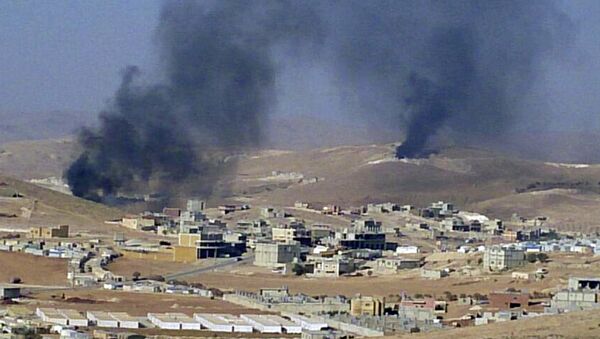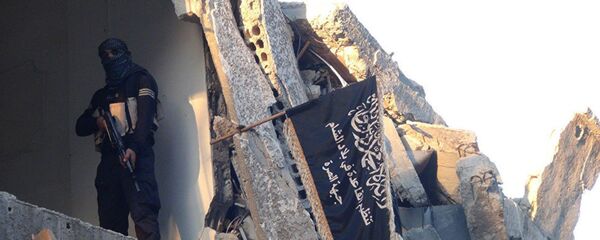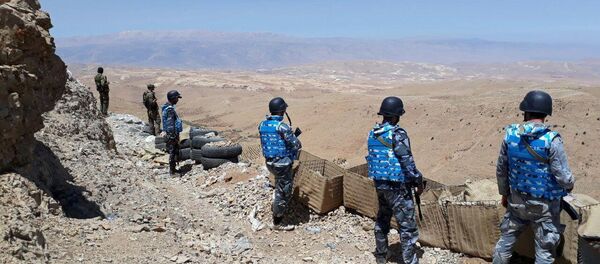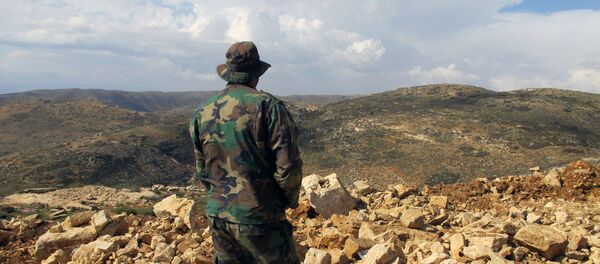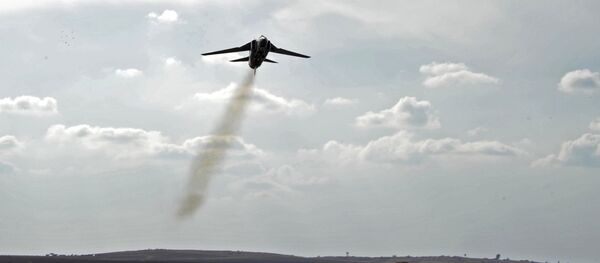Lebanese resistance fighters have brought me to the frontline, where I can see caves that were turned into prison cells, dugouts, and a place in the gorge where Nusra militants made car bombs. Mine clearing is in full swing at the infrastructure facilities.
STORY OF LEBANESE POWs
Every single Lebanese person, and even people from around the world, has heard about Aarsal, a small Lebanese town and municipality on the border with Syria, in August 2014, when the Syrian war was in its third year. Seeking to expand their territory, the militants pressed towards neighboring Lebanon. But the plans of the al-Nusra Front and the Islamic State (Daesh, a terrorist organization banned in many countries), which were allies then, were foiled by several days of bloody fighting with the Lebanese Army and Hezbollah.
The retreating terrorists took several soldiers and policemen with them, which led to a nationwide tragedy. The seized men’s relatives and those who were concerned about their fate held demonstrations in central Beirut and blocked the country’s main roads to demand that every possible measure be taken without delay to secure the hostages’ release. The militants poured more fuel into the fire by posting videos of other prisoners’ executions. Negotiations lasted almost two years before al-Nusra Front militants released their prisoners. However, the fate of those seized by Daesh remains in question.
"Please, don’t come any closer," a Shia man shouts. "We’ve only just discovered this facility, our men must check it for explosives and mines."
"There must be a whole underground town here. Let’s go look at the place where they made car bombs instead. Inshallah, the boys will finish checking this place for mines while we look around the car bomb place, and you’ll be able to get back here," Adnan, who is accompanying me, says in a ringing voice.
There is hardly anything left from the car bomb workshop. The walls are ridden with bullets, one of which has completely collapsed into the field. I can see burnt engines and broken car bodies. A bit lower in the valley stands a French-made infantry fighting vehicle, which the militants stole from the Lebanese army. It is now nothing more than a burnt-out shell. The general picture is like one from a horror movie, the one in which a group of young people gets stuck in a desert when their car breaks down. When they find the nearest gas station, they see heaps of rusty cars in the backyard. It was a good day for us: we did not meet the maniac with a toothless grin.
"I can tell you that the facility we have found was a huge prison with one-man confinement cells where prisoners were tortured and a big room for the wardens. There are brand-new blankets and lots of foods. It appears that the Nusra militants left in a hurry the day before yesterday. We’ve reported finding the prison to our superiors. It could be the place where our soldiers, those who were taken prisoner in 2014, were kept," says a crackling voice from one of the nearby fighters’ radio.
I did my best to convince them to let me see the prison, but to no avail. The experts continued with their job. Curiosity does not justify taking unnecessary risks.
"Come back tomorrow. I think you’ll be able to see everything then. But now it’s too dangerous. Even this damaged car bomb workshop has not been fully checked for mines," said a guerilla who calls himself Abu Turab, or the Father of Sands.
The narrow trails in the Aarsal border region were used by smugglers back before the Syrian war. Criminals and opportunistic locals from the nearby villages transported all kinds of goods from Syria to Lebanon by these trails, including historical treasures and diesel fuel. During the subsequent crisis, militants used the trails to deliver weapons, new recruits, foods and drugs, all of which is what an average Syrian militant needs for a comfortable life.
"Militants brought the cars they stole in Lebanon here, to the Al Wayne Wadial [valley] where we are standing now. The best of these cars could still be driving around in Syria. The simpler ones were turned into bombs on wheels and sent back to Lebanon," Abu Turab says pointing to the warped pieces of metal.
In the past six years, militants have prepared dozens of terrorist attacks, which have claimed hundreds of civilian lives. Many of them were staged in the Beqaa Valley and in villages in the border region. But several "death cars" were taken to large cities, including Beirut. Militants also use car bombs to kill and demoralize the opponent before offensives.
The Al Wayne Valley and the rest of the Aarsal mountain region, as well as the Flita area in Syria have been liberated from the al-Nusra militants. The remaining militants are hiding in refugee camps in the Wade Hamid area and El Mallari. It is believed that up to 200 militants led by Abu Malek al-Tally could be hiding in this region.
The Shia resistance groups have surrounded the militants and urged them to surrender so as to prevent civilian casualties, promising them that they would be allowed to leave for Syria.
Having looked at dozens of dugouts, caves and fortifications built by the militants, we decided to return and visit Aarsal where we had an appointment with Deputy Head of the Local District Administration Rima Krunbe.
We drove for about an hour by cherry and peach gardens. Columns of militias drive off roads more often than ordinary civilians on a highway. We climbed on a hill and saw a view of unpaved roads with clouds of dust from rushing cars. The landscape looked like a busy ant-hill.
At the exit from the border area we were met by very young guys. They congratulated and thanked us for the victory. In all probability, a beard and dark tinted windows on an SUV are how the local people identify Hezbollah fighters. Without asking for permission, the guys threw bottles with cold water and cookies into our car through an open window. Thankfully these were not grenades without a safety pin, so none of us had any objections. We thanked them and rushed ahead.
Our quick trip ended at the Lebanese Army military intelligence checkpoint at the entrance to the city of Aarsal. The officer on duty explained that he cannot let us pass under any circumstance. The territory beyond the checkpoint is still a hostile zone, and the press is flatly banned from entering it.
A TALK IN THE GARDEN
We called our acquaintances in the city and agreed to meet outside its borders. This was a good decision. Having arrived at the place of our meeting, representatives of the local community Adib Hudjeiri offered us a cup of coffee in the garden of his relatives, several hundred meters from the entrance to the city. He also invited Krunbe to join us for informal conversation at the same place.
While we were waiting for her, elderly men in the garden were discussing in a rustic manner recent events, the refugee problem and Lebanese policy in general.
"Thank God, we have finally been ridden of the militants. Now our people will again be able to work in their gardens. We have hundreds of thousands of fruit trees in our gorges. Before the war we sold sweet cherries and peaches not only in Lebanon but also in Jordan. We still have the refugee problem. Refugees live better than our people. They have free accommodation, water and electricity. They receive education and health care for free as well, whereas we have to pay for everything. How to convince them to return home if they live a better life here?" said an older man, most probably, the owner of the house, inspired by the conversation.
The refugee problem in Aarsal is indeed very acute. There are over 120,000 refugees compared to 40,000 locals. About 70,000 refugees are officially registered in the migration service. The growth of the Syrian population is accompanied with a high birthrate. About 4,000 baby refugees were born in one of the city’s six hospitals in 2016 alone.
ECONOMIC PROBLEM
We continued talking about refugees with Rima Krunbe, representative of the local authorities. She seemed to be related to the people in the house to some extent, which is not surprising for Lebanese townships.
"Economically, the presence of refugees has negatively affected the life of the local population. There are also threats to security. All this has been going on for four years. During the crisis refugees were given everything for normal life for free, so the Syrian workforce on the market is cheaper than the local one. They can save their earnings whereas Aarsal residents have to spend on electricity, water and the like. Plus, refugees have started doing business although it is banned. Syrians have 700 Syrian shops whereas Aarsal residents only 290, and the gap keeps widening," said Krunbe emotionally and straightforwardly.
She thinks the worst problem is ecological in nature. The city does not have a sewage system. Incredible amounts of dirty water go into the ground every day, poisoning drinking wells because of such a large population.
"The problem with water has caused many diseases. The city does not have a single well with clean water. One of the experts that studied this problem said that if this trend continues, babies with a clear predisposition to cancer will begin to be born in two years," she said, sharing the city’s problems with us.
Having turned down a glass of water, my guide and I asked the young woman what she knew about the talks with the militants that entrenched themselves nearby. She understood us instantly.
"I don’t know many details. We hoped to reach agreement before life loss. Regrettably, former Deputy Head of the City Administration Ahmad Flity, the mediator, did not achieve results and was killed trying to save Aarsal residents, Hezbollah fighters and Syrians [terrorists blasted his car with a rocket]. An excellent agreement has now been reached… I know that people in the Hmeyid Valley are collecting their belongings… Under the agreement, all militants [about 200 people] must leave the Aarsal alpine region," Krunbe said.
The men threw in some village rumors about the agreement on the withdrawal of militants through the Masnaa main border crossing and their dispatch with weapons to Syria’s Idlib Province. Locals say that their chieftain in the Aarsal alpine region, who goes by the nickname of Abu Malek at-Tallior, refused to leave without fighting because he was not allowed to take with him about $30 million in cash. He is said to have received part of this money from the Lebanese authorities to redeem abducted nuns from for Ma’loula, and the other part was allegedly given to him by the Qatari authorities for his combat activities.
"There are white spots in history after any events. They are accompanied by legends and we will hardly ever learn the truth. The main thing is that now Lebanon can claim yet another indisputable victory," said Hudjeiri who organized our meeting. He understood that it was time for the guests to return to Beirut, because at night Bekaa is not as friendly to foreigners as it seems in broad daylight.

